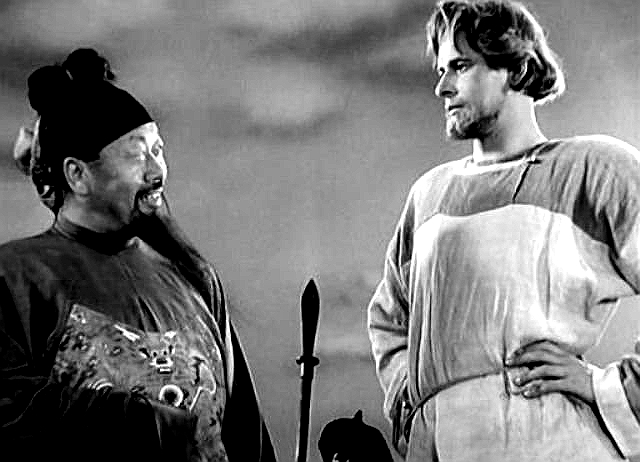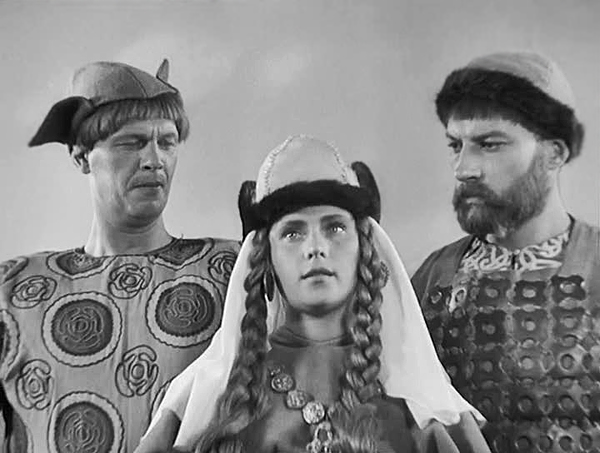Is Prokofiev’s 1938 score for Alexander Nevsky the greatest film music ever written? Not quite, if only for the fact that Sergei Eisenstein’s second sound-picture glorifying historical role models for the ever more tsar-like Stalin, Ivan the Terrible, is darker and more richly textured, and the music’s greater breadth reflects that.
Yet you can’t fault Prokofiev’s spirited response to every war situation in this propagandist masterpiece about the stalwart 13th century prince who sees off an invasion of Teutonic knights in a battle on a frozen lake. It was made at a time when the German threat was imminent, fell into disfavour on the signing of a deceptive peace pact ironically just like the one dismissed in the film, and swung back into action with the unexpected 1941 invasion. Any screening with a live orchestra and chorus is a soul-stirring event, and Martyn Brabbins was heroic master not only of the right, panoramic soundscape but also of the synchronisation which needs not creative conducting but mathematical precision.
That’s to say that only two of the many fiendish cues he had to follow ended just a second or two later than they should have done. And what trenchant, deep sound from the BBC Symphony Orchestra. Purists may lament that the performing version of John Goberman and Hollywood arranger William D Brohn, touring the world since 1986, doesn’t reflect the relative austerity of the forces for which Prokofiev originally wrote (there has been a resurrection of that version conducted and recorded by Frank Strobel).
 It’s true that emulation of such original effects as the blasting of trumpets and trombones directly into the microphone would have been more striking; the BBC brass - which, incidentally, featured a stunning full-throated solo from first horn Nicholas Korth - might have echoed Strobel’s Berliners by flutter-tonguing into their instruments. But the extra glittering armour of the cantata orchestration the composer made in 1939 is irresistible when played with such high profile as this.
It’s true that emulation of such original effects as the blasting of trumpets and trombones directly into the microphone would have been more striking; the BBC brass - which, incidentally, featured a stunning full-throated solo from first horn Nicholas Korth - might have echoed Strobel’s Berliners by flutter-tonguing into their instruments. But the extra glittering armour of the cantata orchestration the composer made in 1939 is irresistible when played with such high profile as this.
The original soundtrack was famously poor thanks to inadequate Soviet equipment, especially in comparison to such American cornerstones of sound cinema as Leopold Stokowski’s work on Walt Disney’s Fantasia. Yet though we had a rather twitchy print last night, the dialogue still came across with the crispness and wonderfully intelligible Russian of Eisenstein’s great actors. Nikolai Cherkassov’s handsome prince, with his high cheekbones and piercing eyes, rivets from his first appearance in the distance from a fishing expedition to outface representatives of the eastern hordes overrunning ancient Russia (pictured above).
His comic counterpart, heroic but humorous Buslai of Novgorod (Nikolai Okhlopkov) who plays friendly rival to a fellow suitor of demure maiden Vasilisa (all three pictured below, Okhlopkov on the left), still makes audiences laugh warm-heartedly. Eisenstein even manages to turn the happy ending into Shakespearean comedy when Buslai, against the commands of his mother (a last-minute cameo from Varvara Massalitinova), gives up the girl and takes instead a warrior woman.
 But the film’s great musical sequences are the devastation of Pskov by the dastardly Teutons, recklessly chucking children onto bonfires, the infallibly stirring rallying song of “Arise, ye Russian people” – reiterated enough times that I bet I’m not the only one still earwormed by it this morning – and the long battle on the ice. Filmically, it’s a brilliant reversal of the expected good and evil colours: Russian soldiers in black and grey, Teutonic knights with their fabulously designed crested helmets in white. Musically, Prokofiev’s resourcefulness never lets up, from viola-jabbing snowy landscape through jaunty combat to percussion-only thrash as the enemy sink into the lake as the ice breaks.
But the film’s great musical sequences are the devastation of Pskov by the dastardly Teutons, recklessly chucking children onto bonfires, the infallibly stirring rallying song of “Arise, ye Russian people” – reiterated enough times that I bet I’m not the only one still earwormed by it this morning – and the long battle on the ice. Filmically, it’s a brilliant reversal of the expected good and evil colours: Russian soldiers in black and grey, Teutonic knights with their fabulously designed crested helmets in white. Musically, Prokofiev’s resourcefulness never lets up, from viola-jabbing snowy landscape through jaunty combat to percussion-only thrash as the enemy sink into the lake as the ice breaks.
The lament of torch-bearing Vasilisa as she comes looking for her suitors on the field of the dead is the time to grieve: in Catherine Wyn-Rogers we had as close a contralto-ish expressive mezzo to the genuine Slavic article as you could hope to get. The BBC Symphony Chorus was magnificent and idiomatic throughout, even though it could do with a few more tenors. The real prince of the evening, though, was Brabbins, who should be mighty pleased with himself for mastering those cues. Now what we need is an Ivan the Terrible with the full score, not the selected chunks of the current unsatisfactory performing version.
Watch Valery Gergiev conducting the Mariinsky Orchestra and Olga Borodina in the cantata version of "The Battle on the Ice" and "The Field of the Dead"















Add comment